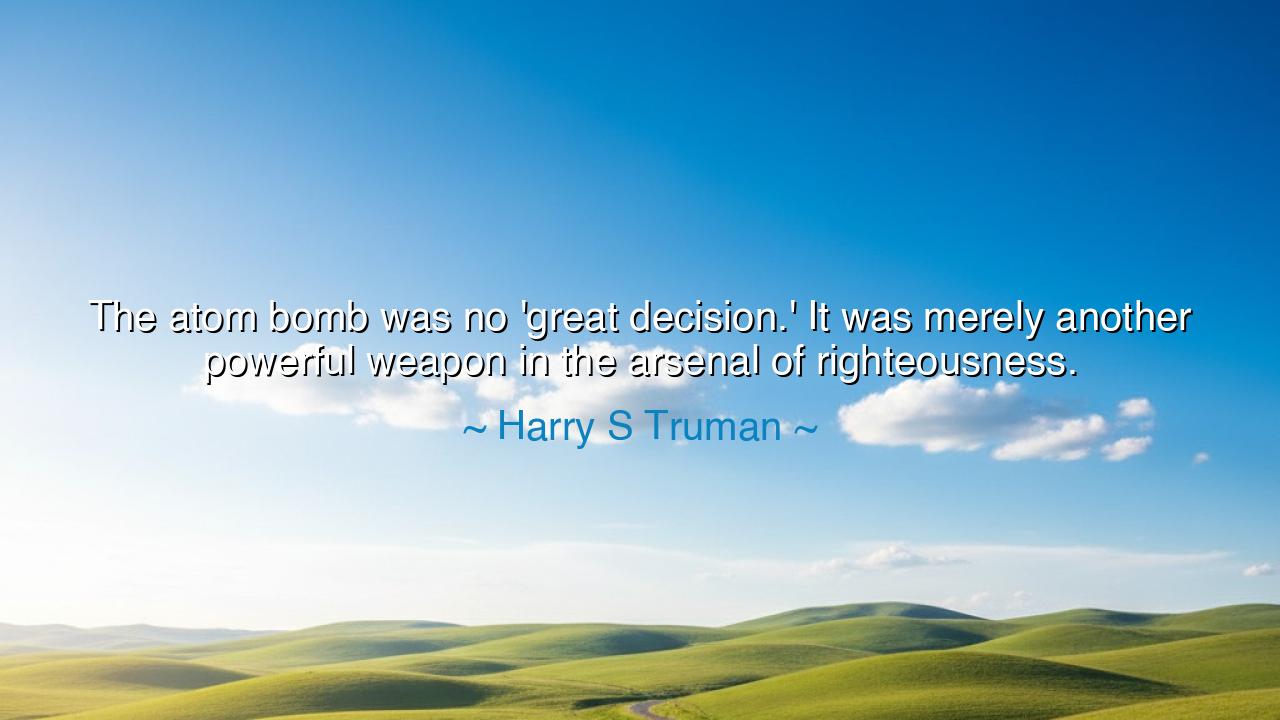
The atom bomb was no 'great decision.' It was merely another
The atom bomb was no 'great decision.' It was merely another powerful weapon in the arsenal of righteousness.






“The atom bomb was no ‘great decision.’ It was merely another powerful weapon in the arsenal of righteousness.” — Harry S. Truman
When Harry S. Truman, the thirty-third President of the United States, spoke these words, he stood at the crossroads of human history. The Second World War had brought nations to their knees, and science had birthed a weapon that could unmake the very world it sought to save. Yet Truman’s statement, solemn and resolute, reveals the terrible clarity of a man who bore the weight of a civilization’s survival. He declared that the atomic bomb was not a triumph of invention or a moment of glory, but a tool of necessity—a weapon used not for conquest, but, as he believed, for the preservation of peace. In calling it “another weapon in the arsenal of righteousness,” Truman sought to frame the act not as cruelty, but as duty—a grim burden undertaken for the greater good.
The origin of this quote lies in the aftermath of the atomic bombings of Hiroshima and Nagasaki in August 1945. Truman had ordered these strikes in hopes of ending the war swiftly, avoiding what military planners believed would be a bloody invasion of Japan that could cost millions of lives. Yet, in the years that followed, the morality of that decision was questioned and weighed by generations. When Truman said the bomb was “no great decision,” he meant that it was not made with hesitation or self-celebration, but with the weary resolve of a leader forced to choose between unbearable options. To him, the war itself—spawned by tyranny, genocide, and the suffering of nations—had already written the logic of the bomb’s use. His task was not to glorify the act, but to end the chaos and restore order to a shattered world.
In the tone of his words, there echoes something ancient—a voice not unlike that of kings and warriors who once spoke of battles fought “in the name of justice.” To call a weapon part of the “arsenal of righteousness” is to claim moral ground in the midst of destruction, to believe that even amidst fire and ruin, there is purpose. Whether one agrees with Truman or not, his declaration reflects a timeless paradox of human power: that those who fight for peace often must wield instruments of war. His statement is both defiance and lament—a recognition that in defending what is right, mankind may be forced to unleash what is terrible.
History has always wrestled with this same truth. When Abraham Lincoln authorized total war to preserve the Union and end slavery, he too bore the burden of violence in pursuit of moral restoration. When the Allied forces stormed Normandy to liberate Europe, countless lives were lost in the name of freedom. Truman’s words emerge from that lineage of hard choices, where leaders must decide not between good and evil, but between evils unequal in scale. It is easy to condemn destruction; harder to bear the duty of ending it. Thus, the atom bomb, in Truman’s eyes, was not a monument of pride, but the final stroke in a grim arithmetic of war—a blow meant to stop the endless cycle of death.
Yet, beneath his justification lies a warning that transcends the centuries. For the arsenal of righteousness, if not tempered by wisdom and humility, can become an arsenal of ruin. The same bomb that ended a war also opened an age of fear, where nations trembled beneath the shadow of annihilation. The fire that promised peace gave birth to the Cold War, and mankind stood on the brink of its own destruction. Here lies the deeper wisdom of history: every weapon born of necessity must one day be laid down by conscience. What is forged for protection must never become an idol of power.
Truman’s quote, then, is not merely about war—it is about the nature of human responsibility. It reminds us that righteousness is not proven by might, but by how one uses that might. Power without morality is tyranny; morality without strength is helplessness. The balance between the two is the eternal test of civilization. Each generation must ask itself: what is the cost of our security, and what becomes of our humanity when the tools we create to defend it threaten to destroy it?
The lesson for us, then, is both humbling and urgent. In every life, there will come moments when choices must be made under the shadow of consequence—when no path is pure, but one must still choose. In those moments, act not with arrogance, but with conscience. Seek not glory in your decisions, but goodness in your intent. And when you wield power—whether over nations, people, or even your own words—remember Truman’s burden: that the greatest strength is not in force, but in restraint.
So, O listener, take this wisdom to heart. The bomb, the sword, the voice, the hand—all are instruments. Whether they destroy or heal depends on the spirit that guides them. To build an “arsenal of righteousness” is not to arm oneself with weapons, but with virtue—with justice, compassion, and courage. For only when these rule the heart can mankind wield power without being consumed by it. In this lies the true victory: not in the might of the atom, but in the mastery of the soul.






AAdministratorAdministrator
Welcome, honored guests. Please leave a comment, we will respond soon